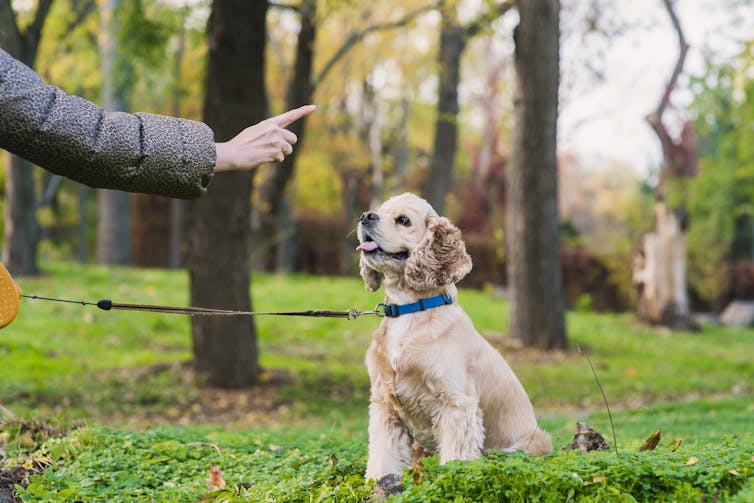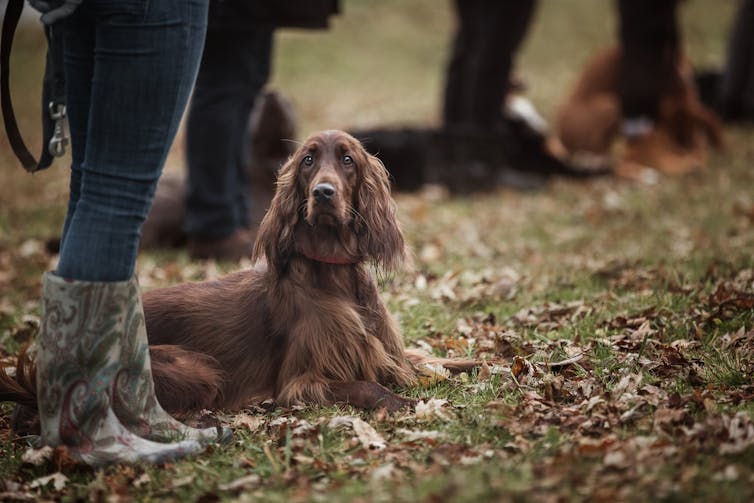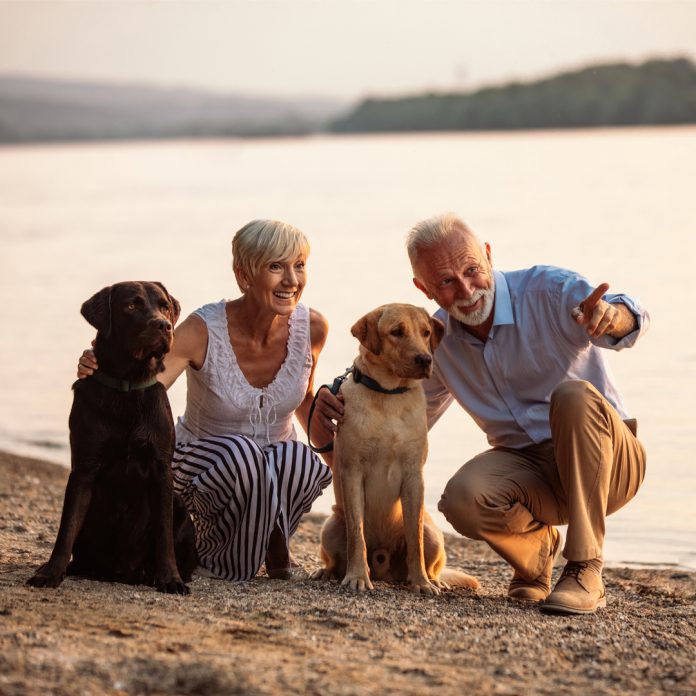How to train your dog in basic ‘life’ skills – and why it’s important

Jacqueline Boyd, Nottingham Trent University
Every year at Crufts, the UK’s largest dog show, canines and their people can participate in all manner of exciting competitions. Whether heelwork-to-music (essentially dancing with dogs) or obedience, or the high-speed relay races of flyball, it can be a marvellous feast of fun for performance dogs.
Of course, the reality is that most companion dogs will never enter the dog show ring – what they need to learn are the skills for everyday life.
The importance of a “canine good citizen” – a dog that can happily co-exist in human society – cannot be underestimated. A well trained dog benefits humans and dogs alike by enhancing the bond between animal and owner. And well behaved dogs are less likely to be relinquished too.
So, helping our dogs learn how to conduct themselves is one of the most important things we can do. But what skills are “must have” and what factors do we need to take into account before beginning the training process? Here are some things to think about.
The key “essential” skills
Having dogs brings with it many responsibilities. The Kennel Club’s canine code highlights issues such as what identification your dog should wear on their collar and the importance of cleaning up after your dog defecates in a public place.
But our dogs also need to be able to function in society. This means they need to be able to cope with other people, other dogs and a whole host of situations. If not, dogs can become fearful or start to display other problem behaviours that can decrease their quality of life.
We can teach young dogs how to behave appropriately through building positive associations with everyday situations and rewarding the behaviours we want. Allowing them to rehearse and repeat good behaviour is key.
Recall – your dog returning to you when called – is one of the most crucial skills for all dogs, and it can be dangerous to others if it’s not well learned.
Every time our dogs return to us whether called, or spontaneously, we should reward and “pay” them well. That ensures that they will want to come back to us when called, rather than follow their urge to chase the runner or squirrels, or go to greet other dogs in the park.
The principle of rehearse and reward applies to all the life skills we want from our dogs, from walking calmly on lead to interacting with people and other animals in a friendly way – or simply sitting quietly beside us while we have a coffee. Training our dogs to be able to spend time alone is also important to avoid problematic separation-related behaviour.

Osetrik/shutterstock
Reward-based training works for older dogs too. Dogs that have been rehomed, and perhaps had a less than ideal start to life, can begin to regain confidence and learn (or relearn) skills while also building a close partnership with their new human.
Doggy differences
It’s important to remember that different dog breeds and types have different “inbuilt” skill sets. Thousands of years of selective breeding means that dogs are one of the most diverse species on the planet, varying in shape, size, overall appearance and behaviour.
Different dog breeds and types, from gundogs to hounds, terriers to toy dogs all have individual characteristics. Some, such as gundog breeds – which include spaniels and retrievers – will be more likely to carry items or sniff when on lead. Others will be more likely to chase and be interested in moving objects, such as collies and terriers. Dogs that are mixed breed will often show mixed characteristics too.
Learning all about your dog’s breed and personality traits is important for effective training and rewarding.
It will allow you to channel instinctive behaviours in a positive way to minimise the chance of problem behaviour developing. Instead of developing an interest in chasing the local cats or wildlife, for example, terriers can be encouraged to partake in controlled chasing of toys. Hounds who love to sniff everyone and everything can be trained in scent work as a fun way to exercise their nose, brain and body in a managed way.
Trainers are available
It is our responsibility to help our dogs learn the key skills for a happy life in a fair and effective way. Dog training has come a long way from the excessively regimented, domineering and sometimes punishment-based training of before.
Skilled training now involves working as a partnership and building a good relationship with your dog. Training in this way also makes the experience enjoyable for our dogs, and more likely that they will engage with us.
If you are looking for a trainer to work with you and your dog, find someone who is knowledgeable, appropriately qualified and can make training fun and fair for both you and your dog – after all, much of dog training involves training their humans too. You can also join a training class, and it’s always a good idea to go and view a session or speak to the trainer in advance of signing up.
To ensure we have a happy canine companion we must equip our dogs with the skills that will help them to enjoy a fulfilling and stress-free life. And who knows, maybe next year you’ll want to join your canine chum in the “Good Citizen” ring at Crufts, where less show-savvy dogs can demonstrate their life skills in a fun and less formal atmosphere.![]()
Jacqueline Boyd, Senior Lecturer in Animal Science, Nottingham Trent University
This article is republished from The Conversation under a Creative Commons license. Read the original article.









The name of the article suggests that after reading it you will come to know of the way to teach basic skills to your dog but after reading the full article all you get to know is that your dog should be skilled in certain skills and that you should engage a dog trainer to get your dog those skills.
Comments are closed.